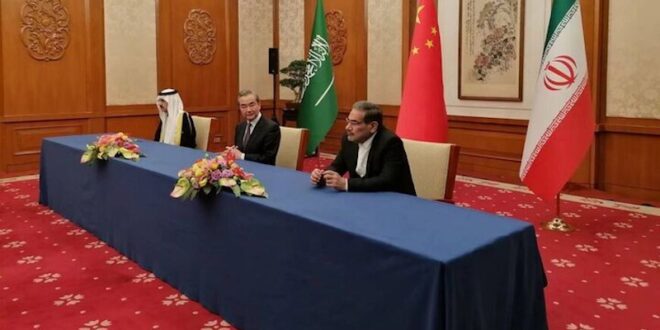For those within the Anglophile world, the recent agreement cut between Saudi Arabia and Iran, brokered by China, received scant reporting. The deal re-establishing relations between Saudi Arabia and Iran after a seven-year hiatus, may potentially become a major pillar for stability within the region.
Relations turned sour when the Saudi authorities executed a Shiite cleric Nimr Al-Nimr, back in 2016. This resulted in mobs storming the Saudi Arabian Embassy in Tehran, and the breaking off of diplomatic relations.
Iran and Saudi Arabia agreed last Friday in Beijing to restore diplomatic ties by reopening their respective diplomatic missions within the next two months. Shiite majority Iran and Sunni majority Saudi Arabia re-establish a nexus between two competing Islamic leaders, within the Middle East and North African region.
President Xi Jinping visited Saudi Arabia last December, and hosted the Iranian president Ebrahim Raisi in Beijing last month. The deal was signed just after President Xi, was re-elected for an unprecedented third term.
This is part of a broader Chinese initiative to broker a wider agreement, which includes Iraq, and Oman to reduce tensions in the region, and potentially realign the Middle East.
The success of this deal may be observed early with the conflict in Yemen, where the Iranian supported Houthi fighters are at war with the Saudi supported government. Houthi rockets are occasionally fired into Saudi Arabia. There has also been proxy competition between the Saudis and Tehran in Syria, Lebanon, and Iraq.
Although the agreement is a step in the right direction between Saudi Arabia and Iran, the Saudis may be hesitant to increase trade dramatically, due to US sanctions against Iran. Many pundits believe that Israel is alarmed at the deal. However, with the Abraham Accord brokered by the Trump administration just before the end of its term, there is now a firm and indirect channel for Israeli-Iranian communication, which could be positive. Saudi Arabia has been cooperating with Israel for some time and maybe able to broker some understandings. There is at least a chance that Israel and Iran may be able to come to some understanding away from US pressure.
The real winner is China
Perhaps the biggest game-changer of the deal is the ‘coming out’ of China as an international peace maker. The agreement caught the US by surprise, even though the White House had said it was being briefed as the negotiations were progressing. The significance of the agreement is the US and Russia are now joined by China as a major influence within the region. China has become a third player in the eyes of MENA nations, which extends to diplomatic influence from Asia, right across Central Asia, into the MENA. This is broad influence the US doesn’t share at this point of time.
US influence is waning in influence across the region all the way to Asia. South-East Asia very much accommodates China in their national foreign policies. The US withdrawal from Afghanistan left a vacuum of US influence in Central Asia, when they withdrew their military.
This has to be seen as a major setback to the US as oil and military cooperation are the two biggest issues of importance to US interests. China is now a well-funded alternative sphere of influence, where the US cannot match due to the financial stress resulting from the current war in Ukraine.
China’s Belt and Road Initiative (BRI) is now kicking in. It wasn’t the ‘debt trap’ many Western political commentators were saying. BRI is becoming an integral part of the trade infrastructure. Countries across the region are still signing up for projects. China is also a member of the BRIC, a general trade alliance between Brazil, Russia, India, and China. This is now operating at many levels and beneficial to all parties.
It may be necessary for the US, as it would be for Australia to now undertake a complete foreign policy review. China has time and time again promoted multilateralism, which is their preferred platform for cooperation. This is the pathway the US may find advantageous with Iran to renegotiate any nuclear agreement. Having China involved would carry great weight over Iran.
China is now preparing a diplomatic peace initiative between Russia and the Ukraine with President Xi’s forthcoming visit to Moscow.
These are the new realities.
 Eurasia Press & News
Eurasia Press & News




